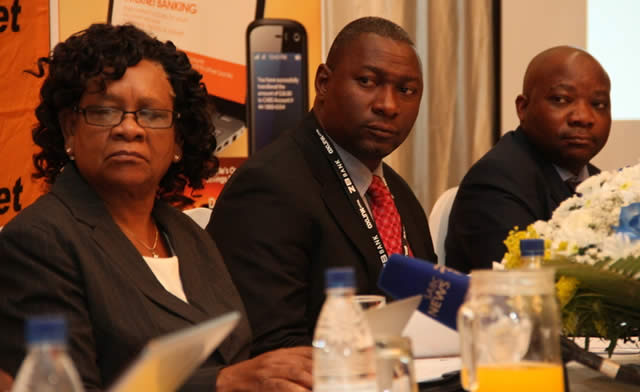RBZ disputes $7,5bn in informal sector


Minister of ICT, Postal and Courier Services Supa Mandiwanzira (centre) is flanked by Reserve Bank of Zimbabwe divisional chief Norman Mataruka (right) and Secretary in the Ministry of SMEs Evelyn Ndlovu at the Oxylink Mobile Money and Digital Payments conference yesterday
Business Reporter—
The Reserve Bank of Zimbabwe has disputed claims that an estimated $7,5 billion is circulating outside the formal banking system. Reserve Bank of Zimbabwe director for bank supervision Mr Norman Mataruka told the Oxylink mobile money and digital payments conference it was impossible such a huge amount of money could be changing hands in the informal sector.
“If $7,5 billion was outside the formal banking system, then where do those particular people do their shopping, where do they buy? Do they just keep the money like gold, which is in a safe,” he asked, adding that even RBZ Governor John Mangudya did not agree with the claims.
“They need to engage in normal transactions and if they engage in normal transactions that money will still go back into the normal banking system.”
But Small to Medium Enterprises and Co-operative Development Permanent Secretary Ms Evelyn Ndlovu said $7,5 billion was circulating in that sector.
“That money, which we say is about $7,5 billion is there,” she told the conference, adding that SMEs and other players in the informal economy were concerned about the safety of their money.
Ms Ndlovu said a study carried out with assistance of the World Bank had revealed that the informal sector was liquid.
She said the money did, however, not stay in the hands of the small players, who in most cases were not the owners of the busi- nesses.
The money was used by owners of the businesses to import other goods from outside the country, which was why the country’s import bill remained high, she said.
Ms Ndlovu called on the central bank to come up with mechanisms that limited amounts of money that individuals could take out of the country.
Meanwhile, the RBZ has developed an oversight framework and mobile money guidelines to foster sanity and transparency in the sector as mobile financial activities since dollarisation reached a milestone of $6,1 billion.
This framework and guidelines will cover guidance on observing and monitoring risks such as money laundering, fraud, and financing of terrorism.
Mr Mataruka said the central bank was set to introduce a framework that would enhance competition and innovation within the mobile money business.
He said the framework will also allow service providers to focus on refining operations and promoting customer adoption.
“Mobile phones have become an indispensable means of communication across the world and have improved the way of life hence we saw the need to come up with a framework to create sanity in the sector,” said Mr Mataruka.
He said the expansion of mobile network coverage in Zimbabwe had created great scope for mobile network providers to collaborate with banks to provide financial services to remote parts of the country.
Total mobile financial activities for the period 2009 to 2014 was $6,1 billion while total electronic money balance for the period was $60 million as at July 24 2015.











Comments